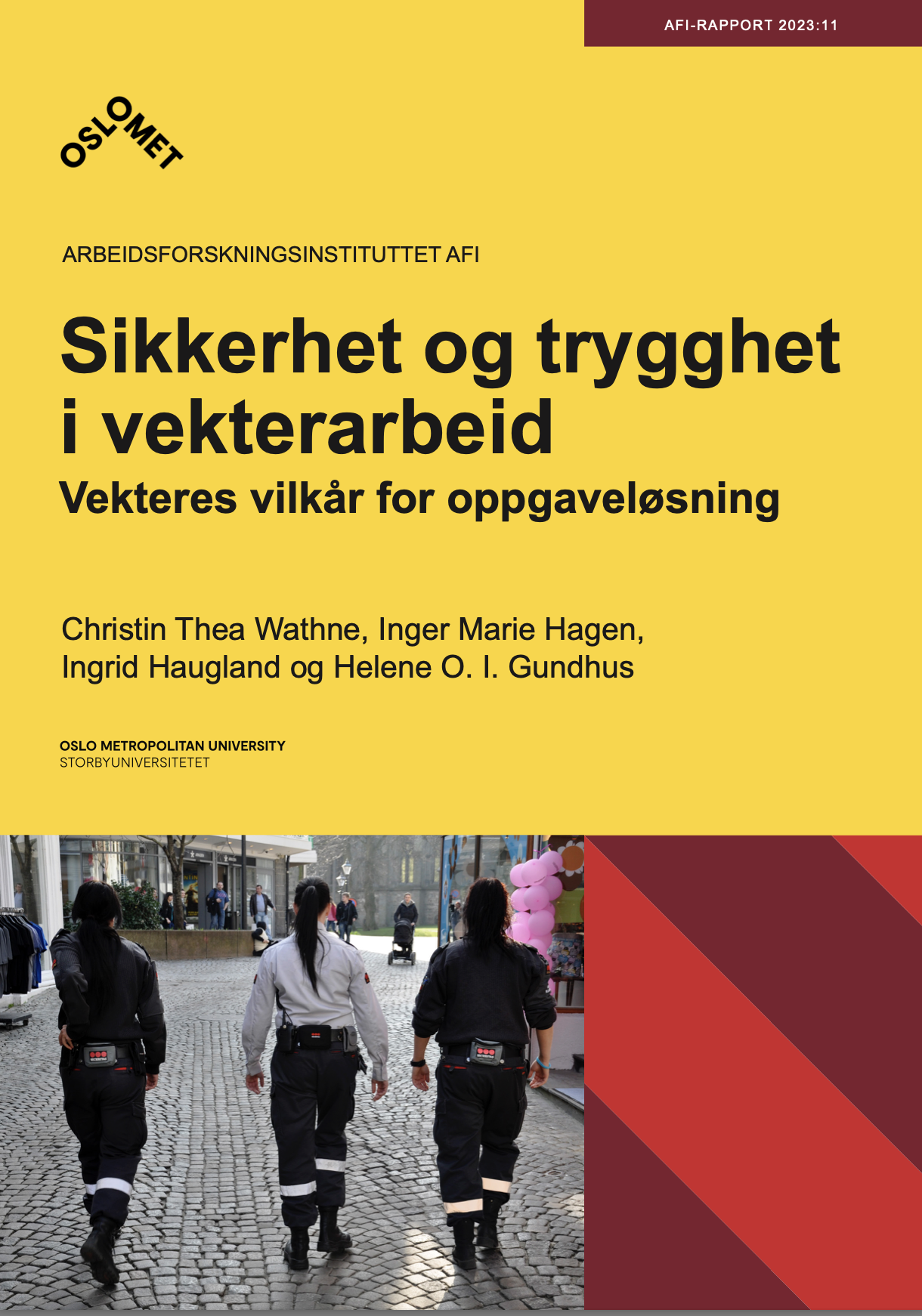Norwegian security guards dread work among violence and threats
Norwegian security guards are ill-prepared to face a tough work environment, according to a new report from the Work Research Institute at OsloMet. One in four dreads going to work.
In recent years, security guards have taken over many tasks traditionally handled by police.
“It is a challenging job,” one security guard tells the Nordic Labour Journal.
Together with chief health, safety and security representative Simon Dragland Knutzen at Securitas, the security guard has agreed to talk about their work and comment on the findings in the new report from the Work Research Institute (AFI). The guard wishes to remain anonymous.
On top of their job?
AFI was asked in 2022 by the Norwegian Union of General Workers to carry out a survey of how security guards experience their work situation, with a particular focus on safety and security. The research project was carried out by Christin Thea Wathne, Inger Marie Hagen and Ingrid Haugland, together with Helene I.O. Gundhus at the University of Oslo and the Norwegian Police University College.
One of the questions in the survey was: To what extent do security guards feel they are on top of their professional tasks and how do they rank safety and security in their work? What are their experiences of harassment, threats and violence at work and how are they being looked after by employers?
The answers were not particularly inspiring for the sector. Results show things are not especially good.
 “The report paints a somewhat depressing image of security guards’ working life. It is surprisingly bad in certain areas. These results must be taken seriously,” AFI researcher and project leader Christin Thea Wathne tells the Nordic Labour Journal.
“The report paints a somewhat depressing image of security guards’ working life. It is surprisingly bad in certain areas. These results must be taken seriously,” AFI researcher and project leader Christin Thea Wathne tells the Nordic Labour Journal.
In their conclusion, the researchers say:
“Solo work, lack of support, too little/inadequate training and lack of equipment are among the reasons security guards feel they are not on top of their job. There is also an imbalance in the security guards’ mandate and the situations they might have to deal with.”
New roles, important tasks
Security guards have taken on many of the less serious public order and control tasks traditionally handled by police. The National Police Directorate and the Confederation of Norwegian Enterprise NHO also entered into an agreement in 2018 that says the police and the security sector should work closer together to prevent crime and maintain order.
In the survey, security guards say they feel they play a central role in this work. One of them put it like this:
“The feeling that you are doing something good for society is quite high on the list. Feeling that you make the world a little bit safer for others (…) Helping someone is a fantastic feeling in itself, being able to return home and knowing that you have helped a person. This can be service-related or security-related.”
“Being on the frontline meeting a varied public can make security guards’ work meaningful, but this position can also represent a risk for the guards themselves,” the report says.
“We are everywhere all the time and meet people who are sick or people who are about to do something stupid,” one of the security guards is quoted in the report.
Calling for more correct training
In order to prepare for this kind of job reality, security guard training is more comprehensive today than it was some years back. Still, many of the security guards say the training is not good enough.
4 in 10 security guards say they are dissatisfied with their training in relevant legislation and regulations. They are also dissatisfied with the training in communication and conflict resolution, first aid and fire safety.
Nearly half say the lack of training has an impact on their sense of achievement and their ability to perform the job properly.
“We do things we are not properly trained to do and which we have not rehearsed. It is like putting someone into any type of work without the proper training. It is unsurprising if some feel insecure at work,” says the security guard who has agreed to talk to the Nordic Labour Journal.
National Secretary at the Norwegian Union of General Workers Terje Mikkelsen is surprised that so many feel they have not been given the necessary training to master their job.
 “In recent years we have done a lot to strengthen our training. But we have clearly a way to go here, and I think much of this must be done in the individual companies through cooperation between workers’ representatives, safety representatives and leadership,” says Mikkelsen.
“In recent years we have done a lot to strengthen our training. But we have clearly a way to go here, and I think much of this must be done in the individual companies through cooperation between workers’ representatives, safety representatives and leadership,” says Mikkelsen.
Stomach ache
The researchers say security guards pay for the lack of a sense of achievement by worrying about going to work, experiencing stomach aches when they return home and dreading going back to work.
- Nearly 1 in 4 has dreaded going to work once or more times over the past month.
- Nearly 1 in 5 security guards say they have been scared at work in the past three months.
- 3 in 10 have a bad gut feeling when they return from work because they did not have time or the right resources to do the job as well as they had wanted.
“I worry about the psychological strain security guards like us expose ourselves to over time. We see and experience things that make a lasting impression. It can be exhausting. For some, it might take away the joy of being a security guard after a while,” thinks security representative Simon Dragland Knutzen at Securitas.
“We talk to colleagues, leaders and our closest family members, but mostly about more serious issues. We are good at writing reports about serious incidents, but there is little in these reports that say anything about how we feel as human beings. We have to do something about this,” says Dragland Knutzen.
Threats and violence
Security guards are among the occupational groups that face the most violence, threats and harassment at work, along with health and social workers, police and military personnel.
“The report confirms what we already knew: There is a frighteningly high number of security guards, especially those on the front line, who have experienced everything from being shouted at to being physically attacked,” says the National Secretary at the Norwegian Union of General Workers Terje Mikkelsen.
- 3 in 4 security guards have experienced being called bad things.
- 4 in 10 security guards have experienced being spat at.
- 1 in 4 security guards has experienced being hit (with no physical injuries).
- 1 in 4 security guards has experienced being physically injured.
The security guards say what they can tolerate best is to be called bad things – nearly half of them say they do not take action when this happens.
“We are hated. Nothing of what we do is good enough. Because we are in a service job, we try to please everybody. But this is not always possible,” the anonymous security guard tells the Nordic Labour Journal.
“Of course, I don’t want a job where people tell me they want to kill me, shoot me or knock me down. I guess nobody wants a working environment like that. But that is sadly the reality for us right now,” the security guard says.
Hidden numbers
The report shows that not all undesirable events are reported to HR. The most worrying results are:
- 1 in 3 security guards says they do not feel sure their employer will look after them if they are the victims of an undesirable event.
- 3 in 10 security guards say they to a small degree or not at all feel they can report mistakes or mishaps without fear of negative consequences for themselves.
“When around 3 in 10 security guards feel it is not safe to report mistakes or mishaps to their employer, and generally say they have little individual agency when it comes to their own work situation, we need to really look at how this sector of our frontline services actually work in practice,” the researchers underline in the report.
Wants statutory protection
Simon Dragland Knutzen argues Securitas has good tools and systems for addressing serious events.
“The police say we must report violence and threats. So we report violence and threats. With us, it is the employer and not the individual security guard who does the reporting. Yet it is still the security guard who has to face this. Many sadly experience that a few weeks later a letter comes, informing them the case has been dismissed. When you have experienced this a few too many times you lose faith in the system. So the next time you are hit, you don’t bother to report it,” says Dragland Knutzen.
Security guards argue for improved statutory protection on the same level as healthcare personnel, teachers and police officers. According to Norwegian law, violence against people in particularly vulnerable occupations will result in a fine or prison for up to three years.
“As long as hitting or threatening a security guard has no consequence, there will always be people who do it,” the anonymous security guard tells the Nordic Labour Journal.
- The report
-
The report is called Security and Safety in the Security Guard Occupation. You can read the report here (in Norwegian).
The report is based on two focus group interviews and a survey of security guards who are all members of the Norwegian Union of General Workers. Union membership is 54 per cent. 71 per cent are men and 29 per cent are women.
The sector employs some 11,000 people (source: Statistics Norway).
The average security guard has more than 10 years of experience in the security industry and works full-time.

 Follow us on Facebook
Follow us on Facebook
